中考英语非谓语动词的用法讲解
初三的非谓语动词讲解
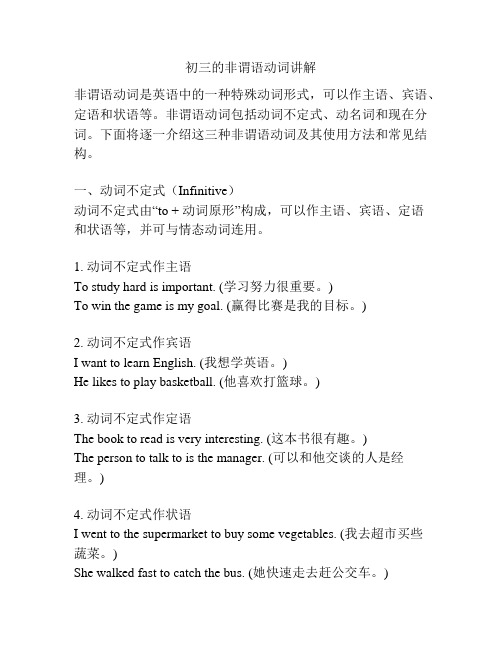
初三的非谓语动词讲解非谓语动词是英语中的一种特殊动词形式,可以作主语、宾语、定语和状语等。
非谓语动词包括动词不定式、动名词和现在分词。
下面将逐一介绍这三种非谓语动词及其使用方法和常见结构。
一、动词不定式(Infinitive)动词不定式由“to + 动词原形”构成,可以作主语、宾语、定语和状语等,并可与情态动词连用。
1. 动词不定式作主语To study hard is important. (学习努力很重要。
)To win the game is my goal. (赢得比赛是我的目标。
)2. 动词不定式作宾语I want to learn English. (我想学英语。
)He likes to play basketball. (他喜欢打篮球。
)3. 动词不定式作定语The book to read is very interesting. (这本书很有趣。
)The person to talk to is the manager. (可以和他交谈的人是经理。
)4. 动词不定式作状语I went to the supermarket to buy some vegetables. (我去超市买些蔬菜。
)She walked fast to catch the bus. (她快速走去赶公交车。
)二、动名词(Gerund)动名词是动词-ing形式,在句中作主语、宾语、定语和状语等。
1. 动名词作主语Swimming is good for health. (游泳对健康有益。
)Reading books is my hobby. (读书是我的爱好。
)2. 动名词作宾语I enjoy singing. (我喜欢唱歌。
)He loves playing football. (他喜欢踢足球。
)3. 动名词作定语A sleeping baby looks so peaceful. (正在睡觉的婴儿看上去很平静。
非谓语动词讲解(超全)
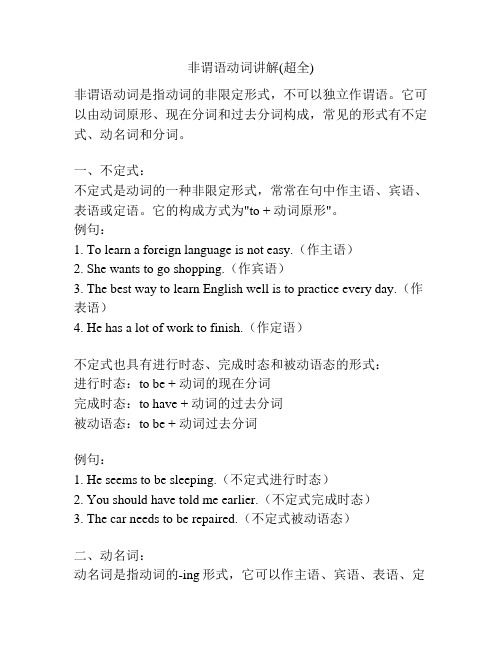
非谓语动词讲解(超全)非谓语动词是指动词的非限定形式,不可以独立作谓语。
它可以由动词原形、现在分词和过去分词构成,常见的形式有不定式、动名词和分词。
一、不定式:不定式是动词的一种非限定形式,常常在句中作主语、宾语、表语或定语。
它的构成方式为"to + 动词原形"。
例句:1. To learn a foreign language is not easy.(作主语)2. She wants to go shopping.(作宾语)3. The best way to learn English well is to practice every day.(作表语)4. He has a lot of work to finish.(作定语)不定式也具有进行时态、完成时态和被动语态的形式:进行时态:to be + 动词的现在分词完成时态:to have + 动词的过去分词被动语态:to be + 动词过去分词例句:1. He seems to be sleeping.(不定式进行时态)2. You should have told me earlier.(不定式完成时态)3. The car needs to be repaired.(不定式被动语态)二、动名词:动名词是指动词的-ing形式,它可以作主语、宾语、表语、定语或状语。
在句中的位置和用法与名词相似。
例句:1. Reading is my favorite hobby.(作主语)2. I enjoy swimming in the summer.(作宾语)3. Her dream is becoming a famous singer.(作表语)4. The girl standing over there is my sister.(作定语)5. He went to the party without saying goodbye.(作状语)动名词与不定式的区别在于动名词具有进行时态和被动语态,而不定式没有。
非谓语动词的详讲解细

非谓语动词初中非谓语动词句型归纳根据《九年义务教育全日制初级中学英语教学大纲》的要求,初中阶段,只要求学生掌握非谓语动词中的动词不定式基本用法,但是,在中考中,非谓语动词其它形式的固定结构也是考查的重点,为了帮助同学们系统掌握这一语法重点,本文就初中英语非谓语动词的句型及固定配搭归纳如下:一.动词不定式1.主语+decide(hope,agree,choose,fail,wish,learn等)+to do sth.例如:I hope to go to school next week.She agree to get someone to help her.2.主语+ask(tell,get,wish,like,want,teach,know等)+宾语+to do sth.例如:He asked me to come here early.She told us not to worry about her.3.主语+be +happy(glad,pleased,angry,sorry,careful,ready,nice,lucky,等)+to do sth.例如:I'm glad to see you again.I'm sorry to hear that.4.主语+think(make,fine,feel等)+it +形容词(名词)+to do sth.例如:I found it very important to learn English well.I think it possible to finish the work this week.5....too+形容词(副词)+(for sb.)+to do sth....+形容词(副词)enough+to do sth.例如:The boy is too young to go to school.=The boy is not old enough to go to school.=The boy is so young that he can't go to school.6.It's+careful(clever,kind,good,right,wrong等)+of sb.+to do sth.It's +difficult(easy,hard ,important,interesting等)+for sb.+to do sth.例如:It's kind of you to help me.It's hard for you to learn English well.注意:这两个句型的区别是,当somebody与形容词有逻辑上的主谓关系时用of;当somebody与形容词没有这种关系时用for。
初中非谓语动词的知识点概述

初中非谓语动词的知识点概述
非谓语动词是一种特殊的动词形式,不具备时态和人称的变化。
在初中语法研究中,非谓语动词是一个重要的知识点。
本文将对初
中非谓语动词的知识点进行概述。
1. 非谓语动词的基本概念
非谓语动词包括不定式、动名词和分词三种形式。
它们不像谓
语动词可以独立构成句子,通常需要和其他词语一起使用,起到修
饰或补充的作用。
2. 不定式
不定式是非谓语动词的一种形式,通常以"to"开头,例如:to run、to eat。
不定式可以用作名词、形容词或副词的补充,表示目的、原因、方式等。
3. 动名词
动名词是非谓语动词的另一种形式,以-ing结尾,例如:running、eating。
动名词可以用作主语、宾语、表语、宾补等,在句子中起到名词的作用。
4. 分词
分词是非谓语动词的一种形式,有现在分词和过去分词两种形式。
现在分词以-ing结尾,过去分词则有规则和不规则两种形式,如:running、eaten。
分词可以用作形容词、状语、定语等。
5. 非谓语动词的用法
非谓语动词通常用于复合句中,根据具体语境和功能,可以在句子中充当不同的成分。
例如,不定式和动名词可以作为主语、宾语、表语等,分词可以作为形容词或状语等。
总的来说,初中非谓语动词的研究要点主要包括非谓语动词的基本概念和形式,以及在句子中的用法。
掌握这些知识点可以帮助学生正确理解和运用非谓语动词,提高语法表达的准确性。
以上是对初中非谓语动词的知识点概述。
希望本文能对您有所帮助!。
(完整版)初中英语非谓语动词讲解

(完整版)初中英语⾮谓语动词讲解⾮谓语动词之“动词不定式”详解⾮谓语动词就是不充当谓语的动词,分两种。
⼀是动词不定式。
⼆是动词ing形式。
1)作主语To learn English well is not easy. 或It is not easy to learn English well.[说明]动词不定式作主语时,往往⽤it作形式主语,这种句型可归纳为下⾯的句型:e.g. It is + adj.+ 动词不定式如果要说明不定式表⽰的动作执⾏者,可以⽤for+sb.e.g. It is + adj.+ for sb.to do sth.2)作表语(表语⽤来说明主语的⾝份、性质、品性、特征和状态的,表语常由名词、形容词、副词、介词短语、动词的-ing形式、不定式、从句来充当,它常位于系动词(be, become, appear, seem, look, sound, feel, get, smell等词)之后。
)e.g. My wish is to become a teacher.3)作宾语或者宾语补⾜语e.g. Most of us like to watch football matches.e.g. He told me to be here on time.4)作定语:e.g. I have nothing to say about that thing.5)作状语:e.g. He stopped to have a look.[说明] 动词不定式的否定形式:not + to + 动词原形构成e.g. He asked me not to make such a mistake.2、动词不定式与疑问词连⽤:疑问词who, what, which和疑问副词when, where, how, why等后⾯可以按动词不定式,构成动词不定式短语。
e.g. (1) He doesn’t know how to use the machine.(2) How to use the machine is a question.(3) The question is when to go there.3、省去了to 的动词不定式1)let, have, make+do2)感官动词see, watch, look at, notice, hear, listen to, smell, feel, find +to。
中考重点非谓语动词的用法

中考重点非谓语动词的用法非谓语动词是指在句子中充当动词功能但不与主语发生谓语关系的动词形式。
在中考英语考试中,非谓语动词是一个重要的考点。
掌握非谓语动词的用法,不仅可以提升阅读理解和写作的能力,还可以帮助学生正确运用语法知识。
一、不定式的用法不定式是非谓语动词中最常见的一种形式。
它可以作多种用法,如下:1. 作主语:不定式可以单独作为句子的主语,常用结构为:“to + 动词原形”。
例如:To learn a foreign language is not easy. 学一门外语并不容易。
2. 作宾语:不定式可以作动词的宾语,常用结构为:“动词 + 不定式”。
例如:I want to go to the park. 我想去公园。
3. 作表语:不定式可以作动词的表语,常用结构为:“be + 形容词 + 不定式”。
例如:My dream is to become a doctor. 我的梦想是成为一名医生。
4. 作定语:不定式可以修饰名词或代词,常用结构为:“名词/代词+ 不定式”。
例如:I need a pen to write a letter. 我需要一支笔来写信。
5. 作状语:不定式可以表示目的、结果、原因等,常用结构为:“为了/以便/以确保/以防止/以免 + 动词原形”。
例如:He went to the library to borrow some books. 他去图书馆借书。
二、现在分词的用法现在分词是以-ing结尾的动词形式,它可以表示主动, 进行或被动的意义,常用于以下情况:1. 作定语:现在分词可以修饰名词或代词,常用结构为:“名词/代词 + 现在分词”。
例如:The running dog is very fast. 跑步的狗跑得很快。
2. 作状语:现在分词可以表示时间、原因、条件等,常用结构为:“现在分词 + 其他成分”或“由现在分词构成短语”。
例如:Feeling tired, she decided to take a nap. 感到疲倦,她决定小睡一会儿。
中考英语语法之非谓语动词应用

中考英语语法之非谓语动词应用非谓语动词是英语语法中的重要部分,它包括动词不定式、动名词和分词。
在中考英语中,非谓语动词的应用非常广泛。
它可以用作主语、表语、宾语、定语等,除了能够丰富句子结构以外,还可以使语言更加简洁明了。
下面我们就来详细介绍一下非谓语动词的各种用法。
一、动词不定式的应用1. 作主语动词不定式作主语可以使句子重心前置,突出动作的重要性。
例如:To learn English well is my goal.学好英语是我的目标。
2. 作表语动词不定式可以作为表语,说明主语的特点或状态。
例如:His job is to teach English.他的工作就是教英语。
3. 作宾语动词不定式可以作及物动词的宾语,表示动作的目的。
例如:I want to buy a new book.我想要买一本新书。
4. 作宾语补足语动词不定式可以作及物动词的宾语补足语,补充说明宾语。
例如:He made me laugh.他逗我笑了。
5. 作定语动词不定式可以修饰名词或代词,相当于一个形容词。
例如:She has a lot of homework to do.她有很多作业要做。
6. 作状语动词不定式可以表示目的、结果、原因、条件、方式等。
例如:He ran fast to catch the train.他跑得快以赶上火车。
二、动名词的应用1. 作主语动名词作主语具有抽象性,可表示一种通常状态或重复的动作。
例如:Swimming is good exercise.游泳是很好的锻炼。
2. 作表语动名词可以作表语,说明主语的特点或状态。
例如:Her hobby is singing.她的爱好是唱歌。
3. 作宾语动名词可以作及物动词的宾语,表示动作的对象。
例如:I enjoy reading books.我喜欢读书。
4. 作宾语补足语动名词可以作及物动词的宾语补足语,补充说明宾语。
例如:I found him studying in the library.我发现他在图书馆学习。
非谓语动词的用法初中

非谓语动词的用法初中在初中英语的学习中,非谓语动词是一个重要且具有一定难度的语法点。
但别担心,让我们一起来揭开它神秘的面纱,搞清楚非谓语动词的用法。
非谓语动词,顾名思义,就是不能充当谓语的动词形式。
在英语中,主要有三种非谓语动词形式:动词不定式(to do)、动名词(doing)和分词(现在分词 doing 和过去分词 done)。
先来说说动词不定式。
动词不定式的基本形式是“to +动词原形”,比如“to play”“to study”。
它具有名词、形容词和副词的特征,可以在句子中充当多种成分。
作主语时,常常为了避免句子头重脚轻,会用“It is +形容词+for/of sb +to do sth”这样的句型。
例如:“It is important for us to learn English well”在这个句子中,“to learn English well”就是真正的主语,“It”只是形式主语。
作宾语的时候也很常见,比如“want to do sth”“decide to do sth”“hope to d o sth”等等。
动词不定式作宾语补足语也有不少例子,像“ask sb to do sth”“tell sbto do sth”,表示让某人做某事。
再来讲讲动名词。
动名词的形式就是“动词+ing”,它具有名词的特征,在句中可以充当主语、宾语等成分。
作主语时,比如“Playing sports is good for our health”作宾语的情况也很多,比如“enjoy doing sth”“finish doingsth”“practice doing sth”接着是分词。
现在分词表示主动和进行的动作,过去分词表示被动和完成的动作。
现在分词作定语,比如“a sleeping baby”(一个正在睡觉的宝宝),这里的“sleeping”就是现在分词,修饰“baby”,表示宝宝正在睡觉的状态。
中学英语非谓语动词讲解

中学英语非谓语动词讲解非谓语动词是指动词的非时态形式,它包括不定式、动名词和分词(包括现在分词和过去分词)。
非谓语动词可以作主语、宾语、表语、定语、状语等成分,具有多种语法功能和句法结构。
在中学英语中,非谓语动词被广泛使用,掌握非谓语动词的用法对于学生的语言表达能力和阅读理解能力提升非常重要。
一、不定式(Infinitives)1. 不定式作主语:- To learn a foreign language is beneficial to your future.- It's important to exercise regularly.2. 不定式作宾语:- I want to go shopping after school.- He promised to finish the report by tomorrow.3. 不定式作表语:- Her dream is to become a doctor.- The most important thing is to believe in yourself.4. 不定式作定语:- She has a lot of books to read during the summer vacation.- This is a good place to have a picnic.5. 不定式作状语:- I wake up early to catch the bus.- She studied hard to pass the exam.二、动名词(Gerunds)1. 动名词作主语:- Swimming is my favorite sport.- Dancing helps improve coordination.2. 动名词作宾语:- She enjoys reading novels.- He hates doing the dishes.3. 动名词作表语:- His hobby is playing the piano.- The key to success is working hard.4. 动名词作定语:- I have a meeting with my boss tomorrow morning. - The running water sounds relaxing.5. 动名词作状语:- She left the room, crying loudly.- He drove to work, listening to music.三、分词(Participles)1. 现在分词作定语:- The exciting movie kept us on the edge of our seats. - The running boy bumped into a lady.2. 现在分词作状语:- Smiling happily, she accepted the gift.- With his homework finished, he went to bed.3. 过去分词作定语:- The broken chair needs to be repaired.- The lost dog was found by its owner.4. 过去分词作状语:- Inspired by her teacher, she decided to pursue a career in art.- Exhausted from the long journey, they went straight to bed.总结起来,中学英语非谓语动词的用法主要包括不定式、动名词和分词。
中考英语专题:非谓语动词用法详解

中考英语专题:非谓语动词用法详解非谓语动词的含义非谓语动词首先是一种动词形式,其次是这种动词形式不能做谓语,综合这两点,我们将其叫做非谓语动词。
非谓语动词的形式非谓语动词包含四种形式,即不定式、动名词、现在分词和过去分词。
其中,每种形式按照发生时间和主被动又包括不同的子形式。
具体如下:1. 不定式①基本形式:to do(表示主动,并且一般表示将来)②被动式:to be done(表示被动,并且一般表示将来)③进行式:to be doing (表示主动和进行)④完成时:to have done(表示主动和完成)⑤完成被动式:to have been done(表示被动和完成)⑥完成进行式:to have been doing (表示主动和完成进行)The teacher told us to do morning exercises.老师让我们做早操。
The car to be bought is for his sister.要买的这辆车是给他的姐姐的。
She pretended to be reading when the teacher came into the classroom. 老师进来时,她假装正在读书。
The thief is said to have escaped.据说小偷已经逃跑了。
The thief is said to have been arrested.据说小偷已经被抓住了。
She is said to have been working in the factory over the last 20 years.据说在过去的20年里,她一直在这家工厂工作。
2. 动名词①基本形式:doing (表示主动)②被动式:being done(表示被动)③完成式:having done(表示主动和完成)④完成被动式:having been done(表示被动和完成)Travelling in space by ordinary people will be common in the future.在未来,普通人在太空旅行将会是普遍的事情。
非谓语动词用法初三

非谓语动词用法初三对于初三的同学们来说,非谓语动词是英语语法中的一个重点和难点。
非谓语动词在句子中不充当谓语,却有着重要的作用。
接下来,让我们一起深入了解非谓语动词的用法。
非谓语动词主要包括动词不定式(to do)、动名词(doing)和分词(现在分词 doing 和过去分词 done)。
首先,咱们来聊聊动词不定式。
动词不定式具有名词、形容词和副词的特征,可以在句子中充当主语、宾语、定语、状语等成分。
作主语时,为了避免句子头重脚轻,常用 it 作形式主语,把真正的主语动词不定式后置。
比如:“It is important to learn English well”(学好英语很重要。
)作宾语的情况也不少见。
一些动词后常接动词不定式作宾语,比如“want to do”(想要做)、“decide to do”(决定做)等。
当作定语时,动词不定式通常放在被修饰的名词或代词之后。
例如:“I have a lot of homework to do”(我有很多作业要做。
)在状语方面,它可以表示目的、结果等。
“He came here to see me”(他来这儿是为了看我。
)这就是表示目的。
接下来是动名词。
动名词具有名词的特征,在句中可充当主语、宾语、表语等。
作主语时,谓语动词要用单数形式。
例如:“Swimming is good for your health”(游泳对你的健康有好处。
)作宾语时,常见的动词有“enjoy doing”(喜欢做)、“finish doing”(完成做)等。
然后是分词。
现在分词表示主动和进行,过去分词表示被动和完成。
现在分词作定语时,通常放在被修饰的名词之前。
比如:“a sleeping baby”(一个正在睡觉的婴儿)。
过去分词作定语时,一般放在被修饰的名词之后。
像“the book written by Lu Xun”(鲁迅写的书)。
在作状语时,现在分词表示伴随、原因等。
中考英语语法之非谓语动词
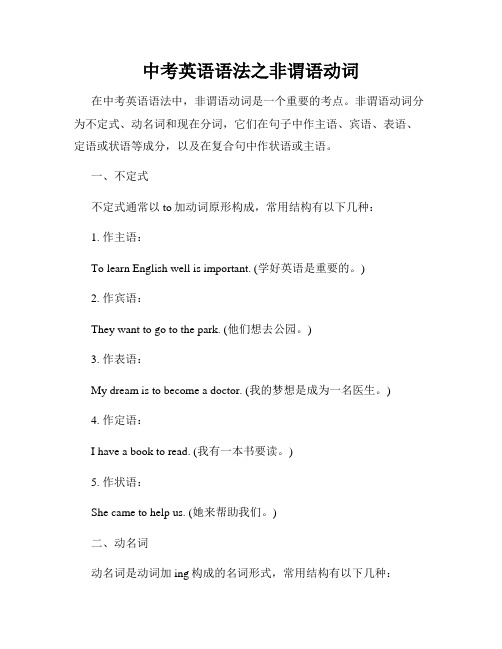
中考英语语法之非谓语动词在中考英语语法中,非谓语动词是一个重要的考点。
非谓语动词分为不定式、动名词和现在分词,它们在句子中作主语、宾语、表语、定语或状语等成分,以及在复合句中作状语或主语。
一、不定式不定式通常以to加动词原形构成,常用结构有以下几种:1. 作主语:To learn English well is important. (学好英语是重要的。
)2. 作宾语:They want to go to the park. (他们想去公园。
)3. 作表语:My dream is to become a doctor. (我的梦想是成为一名医生。
)4. 作定语:I have a book to read. (我有一本书要读。
)5. 作状语:She came to help us. (她来帮助我们。
)二、动名词动名词是动词加ing构成的名词形式,常用结构有以下几种:1. 作主语:Swimming is good for health. (游泳对健康有益。
)2. 作宾语:I enjoy playing basketball. (我喜欢打篮球。
)3. 作表语:His job is teaching. (他的工作是教书。
)4. 作定语:I saw a girl singing in the park. (我看到一个在公园唱歌的女孩。
)5. 作状语:She left the room, crying. (她哭着离开了房间。
)三、现在分词现在分词通常以ing结尾,常用结构有以下几种:1. 作主语:Swimming is my favorite sport. (游泳是我最喜欢的运动。
)2. 作宾语:He enjoys playing the piano. (他喜欢弹钢琴。
)3. 作表语:The movie is interesting. (这部电影很有趣。
)4. 作定语:I saw a girl dancing in the street. (我看到一个在街上跳舞的女孩。
(完整版)非谓语动词语法讲解
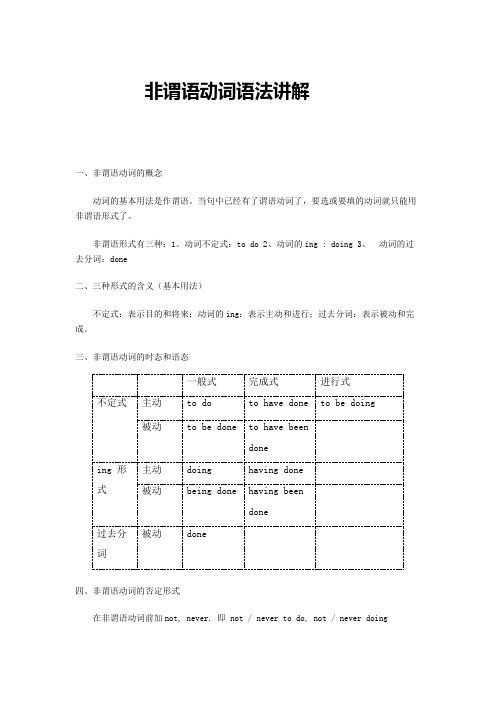
非谓语动词语法讲解一、非谓语动词的概念动词的基本用法是作谓语。
当句中已经有了谓语动词了,要选或要填的动词就只能用非谓语形式了。
非谓语形式有三种:1、动词不定式:to do 2、动词的ing : doing 3、动词的过去分词:done二、三种形式的含义(基本用法)不定式:表示目的和将来;动词的ing:表示主动和进行;过去分词:表示被动和完成。
三、非谓语动词的时态和语态一般式完成式进行式不定式主动to do to have done to be doing被动to be done to have beendoneing 形式主动doing having done 被动being done having beendone过去分词被动done四、非谓语动词的否定形式在非谓语动词前加not, never. 即 not / never to do, not / never doing五、非谓语动词的复合结构不定式的复合结构:for / of sb. to do sth.动词 ing 形式的复合结构:宾格或所有格+doing (-ing 形式作主语时,用的所有格+doing)六、非谓语动词的做题步骤1、判定是否用非谓语形式。
方法:看看句子中是否已有了谓语动词了2、找非谓语动词的逻辑主语。
方法:非谓语动词的逻辑主语一般是句子的主语。
3、判断主被动关系。
方法:非谓语动词与其逻辑主语的主动还是被动关系。
4、判断时间关系。
方法:分析句子,看看非谓语动词所表示的动作发生在谓语动作之前、之后还是同时。
之前常用 done; 之后常用to do; 同时常用doing.学习非谓语形式时,建议把三种形式一起来比较学习,会更加有效一些。
七、非谓语动词作主语和表语的比较1、不定式和动名词作主语和表语a. 不定式表示一次性的、具体的动词。
动词ing 常表示一般的、泛指的或习惯性的动作。
如:________ is a good form of exercise for both young and old.A. The walkB. WalkingC. To walkD. Walk(分析) a good form 暗示泛指一般的行为,用动名词作主语,选 Bb. 不定式作主语时,常用it 作形式主语,即用句型:It is + adj. / n. + (for / of sb. ) to do sth.It’s important for us to learn English well.It’s kind of you to help us.注意:下面几个句型是用动名词:It’s no good / use doing sth.It’s usel ess doing sth.There is no need to do sth.2、不定式、动名词、分词作表语的比较1、不定式、动名词作表语,.表示主语的内容。
非谓语动词用法归纳(语法)
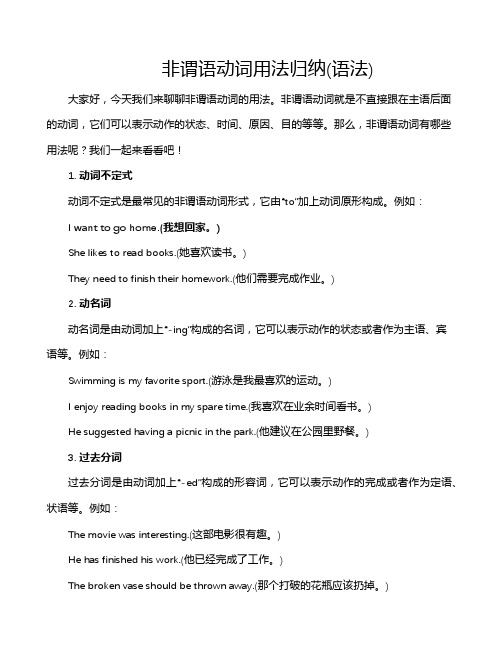
非谓语动词用法归纳(语法)大家好,今天我们来聊聊非谓语动词的用法。
非谓语动词就是不直接跟在主语后面的动词,它们可以表示动作的状态、时间、原因、目的等等。
那么,非谓语动词有哪些用法呢?我们一起来看看吧!1. 动词不定式动词不定式是最常见的非谓语动词形式,它由“to”加上动词原形构成。
例如:I want to go home.(我想回家。
)She likes to read books.(她喜欢读书。
)They need to finish their homework.(他们需要完成作业。
)2. 动名词动名词是由动词加上“-ing”构成的名词,它可以表示动作的状态或者作为主语、宾语等。
例如:Swimming is my favorite sport.(游泳是我最喜欢的运动。
)I enjoy reading books in my spare time.(我喜欢在业余时间看书。
)He suggested having a picnic in the park.(他建议在公园里野餐。
)3. 过去分词过去分词是由动词加上“-ed”构成的形容词,它可以表示动作的完成或者作为定语、状语等。
例如:The movie was interesting.(这部电影很有趣。
)He has finished his work.(他已经完成了工作。
)The broken vase should be thrown away.(那个打破的花瓶应该扔掉。
)4. 现在分词现在分词是由动词加上“-ing”构成的形容词,它可以表示动作正在进行或者作为定语、状语等。
例如:Walking in the park is good for your health.(在公园里散步对身体有好处。
)She is studying English at the moment.(她现在正在学英语。
)The running water sounds very soothing.(流水声听起来很舒缓。
中考英语非谓语动词在语法填空中的运用
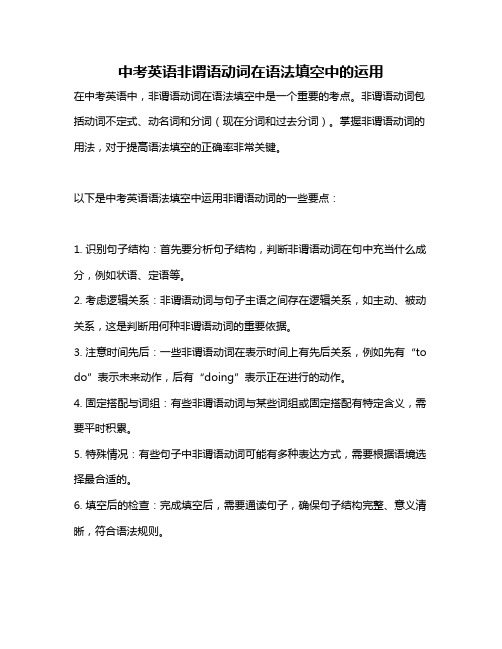
中考英语非谓语动词在语法填空中的运用
在中考英语中,非谓语动词在语法填空中是一个重要的考点。
非谓语动词包括动词不定式、动名词和分词(现在分词和过去分词)。
掌握非谓语动词的用法,对于提高语法填空的正确率非常关键。
以下是中考英语语法填空中运用非谓语动词的一些要点:
1. 识别句子结构:首先要分析句子结构,判断非谓语动词在句中充当什么成分,例如状语、定语等。
2. 考虑逻辑关系:非谓语动词与句子主语之间存在逻辑关系,如主动、被动关系,这是判断用何种非谓语动词的重要依据。
3. 注意时间先后:一些非谓语动词在表示时间上有先后关系,例如先有“to do”表示未来动作,后有“doing”表示正在进行的动作。
4. 固定搭配与词组:有些非谓语动词与某些词组或固定搭配有特定含义,需要平时积累。
5. 特殊情况:有些句子中非谓语动词可能有多种表达方式,需要根据语境选择最合适的。
6. 填空后的检查:完成填空后,需要通读句子,确保句子结构完整、意义清晰,符合语法规则。
为了更好地掌握非谓语动词的用法,建议进行针对性的练习,通过大量的语法填空练习来提高对非谓语动词的敏感度和运用能力。
同时,也要注意积累常见的非谓语动词用法和固定搭配。
中考英语之非谓语动词

1.常见感观动词: see , watch, hear, feel ,
+ing形式 2.感观动词 +动词原形 表示动作的全过程 表示动作正在进行
(1)He saw a purse lying on the ground on her way home. (2)I saw him go into the classroom just now.
D、不定式作定语 熟记下列短语 something to eat
anything else to say something nice to eat
something to drink
much work to do lots of housework to do
1.I have a lot of homework to do. 2.Do you have anything to say? 3. My father has something important to tell me.
go swimming(hiking , fishing, skating , shopping)
do some (cooking, reading, washing, cleaning, shopping)
三、动词原形 1、使役动词:let . make .have 1.Let’s begin our class. 2.Don’t make the baby cry. 3.He always have me do much housework.
Wang Tao hopes to be a scientist in the future and wishes to visit the moon by himself. He would like to collect pictures about the moon very much, so he learns to search the Internet and wants to get more Information . Then he plans to buy a computer, but he can’t afford to buy one. Now he can’t wait to look for a job and decides to work hard at it. At the same time he get ready to make his dream come true.
非谓语动词讲解技巧
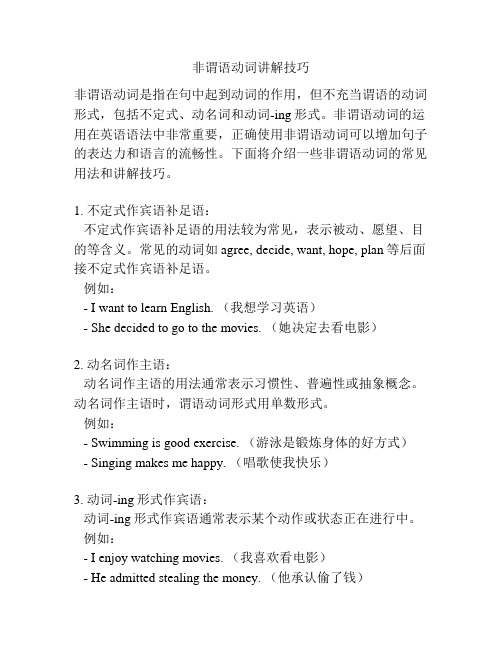
非谓语动词讲解技巧非谓语动词是指在句中起到动词的作用,但不充当谓语的动词形式,包括不定式、动名词和动词-ing形式。
非谓语动词的运用在英语语法中非常重要,正确使用非谓语动词可以增加句子的表达力和语言的流畅性。
下面将介绍一些非谓语动词的常见用法和讲解技巧。
1. 不定式作宾语补足语:不定式作宾语补足语的用法较为常见,表示被动、愿望、目的等含义。
常见的动词如agree, decide, want, hope, plan等后面接不定式作宾语补足语。
例如:- I want to learn English. (我想学习英语)- She decided to go to the movies. (她决定去看电影)2. 动名词作主语:动名词作主语的用法通常表示习惯性、普遍性或抽象概念。
动名词作主语时,谓语动词形式用单数形式。
例如:- Swimming is good exercise. (游泳是锻炼身体的好方式) - Singing makes me happy. (唱歌使我快乐)3. 动词-ing形式作宾语:动词-ing形式作宾语通常表示某个动作或状态正在进行中。
例如:- I enjoy watching movies. (我喜欢看电影)- He admitted stealing the money. (他承认偷了钱)4. 不定式和动名词作宾语的区别:不定式和动名词都可以作宾语,但有时候需要根据具体语境来判断使用哪种形式。
一般来说,不定式更强调动作的结果或可能性,而动名词更强调动作本身。
例如:- I stopped to smoke. (我停下来抽烟)- I stopped smoking. (我戒烟了)5. 不定式和动名词作定语:不定式和动名词也可以作定语,修饰名词或代词。
不定式作定语通常表示目的、结果或用途,而动名词作定语通常表示它所修饰的名词所具备的特征或性质。
例如:- I have a book to read. (我有一本要读的书)- The swimming pool is closed. (游泳池关了)6. 非谓语动词作状语:不定式、动名词和动词-ing形式可以作状语,来修饰句子的动作、原因、目的、结果等。
- 1、下载文档前请自行甄别文档内容的完整性,平台不提供额外的编辑、内容补充、找答案等附加服务。
- 2、"仅部分预览"的文档,不可在线预览部分如存在完整性等问题,可反馈申请退款(可完整预览的文档不适用该条件!)。
- 3、如文档侵犯您的权益,请联系客服反馈,我们会尽快为您处理(人工客服工作时间:9:00-18:30)。
中考英语非谓语动词的用法讲解中考英语非谓语动词的用法讲解非谓语考点讲解以及考题精练【经典剖析】1.动词不定式的构成及时态和语态的变化1) 动词不定式的构成不定式由“to+动词原形”构成,其否定形式是“not to do”。
I asked him to read the text now. 我要他现在读课文。
He asked me not to read the text now. 他叫我现在不要读课文。
2) 动词不定式时态和语态的变化2.动名词的构成及动名词时态和语态的变化1)动名词的构成动名词由动词加-ing构成,它兼有动词和名词的功能。
Collecting stamps is my hobby. 集邮是我的爱好。
Parking is not allowed on this street. 这条街上不允许停车。
2)动名词时态和语态的变化3.分词的种类、构成及时态和语态的变化1)分词的种类与构成分词有两种:现在分词和过去分词。
现在分词由“原形动词加-ing”构成,现在分词表示主动;规则动词的过去分词由“原形动词加-ed”构成,过去分词表示被动。
She was sleeping when I came in. 我进来时她正在睡觉。
The letter was written by my brother. 信是我兄弟写的。
2)分词时态和语态的变化4.动词非谓语形式的句法功能【课堂小练】i t.【经典剖析】1.常用动词不定式作宾语的动词。
It was late, so we decided to take a taxi home.天色已晚,所以我们决定乘出租车回家。
She deserved to win because she was the best. 她应该获胜,因为她是最好的。
2.不定式作宾语,如后面有宾语补足语,常用it作形式宾语,将不定式移至宾语补足语之后。
I find it great fun to learn to drive a car. 我发现学开车真是太有趣了。
We consider it our duty to do so. 我们认为这样做是我们的责任。
常用it作形式宾语的动词的有:3.常用动名词作宾语的动词:[说明]带星号(*)的词为必须掌握的词。
I advise waiting till tomorrow.我建议等到明天。
She enjoys singing very much.她很喜欢唱歌。
When did you finish doing your homework yesterday? 昨天你什么时候做完家庭作业的?Would you mind opening the window? 请你把窗户打开好吗?You must practise speaking English every day.你必须每天练习讲英语。
I suggest doing it (in)a different way.我建议用不同的方法来做这件事。
When I read the story, I can't help thinking of Harry.我读了这故事,忍不住想起哈里。
4. look forward to doing等的用法。
下列动词短语中的to是介词,而不是不定式符号,因此后面需接名词或动名词作宾语。
I am looking forward to hearing from you. 我盼望收到你的信。
He devoted himself to helping the poor. 他致力于帮助穷人。
They have made a great contribution to protecting the wild animals. 他们对保护野生动物作出了很大的贡献。
He is used to getting up early. 他习惯于早起。
I prefer watching TV to going to the cinema. 我喜欢看电视,不喜欢看电影。
【课堂小练】1. 用括号内动词的恰当形式填空:1)Why do you keep ____________________ me questions? (ask)2)I considered ___________________ the job but in the end I decided against it. (take)3)The boy's father promised ______________________ for the window to be repaired. (pay)4)Have you finished _____________________ your hair yet? (wash)5)I refuse ___________________ any more questions. (answer)6)I don't enjoy ____________________ very much. (drive)7)Can you help me ____________________ the dinner ready? (get)8)He looks so funny. Whenever I see him, I can't help _____________________________ . (smile)9)I've put off ____________________the letter for many times. I really must do it today. (write)10) I'm looking forward to _____________________ a few days to myself while the rest of thefamily are away. (have)2. 选择最佳答案填空:1) Would you please ____________ the window? It's too cold outside.A. openB. openingC. not openD. notto open2) Tom likes cars. He enjoys _______________ m odel cars of all kinds.A. collectsB. collectingC. to collectD.collected3) My grandfather wants ____________ around the world because he enjoys _______________ new places.A. travelling; seeingB. to travel; to seeC. to travel; seeingD. travelling; to see4) Before 2011 we will finish ______________the library.A. buildB. builtC. buildingD. tobuild5) If everyone makes a contribution ________________ the environment, our country willbecome more beautiful.A. to protectB. in protectingC. to protectingD. forprotecting6) They preferred ____________ i n bed to ___________ horses.A. to lie; to rideB. lying; ridingC. to lie; rideD. lying;ride7) Would you mind ___________ me how ___________ E nglish words?A. tell; to rememberB. telling; rememberC. telling; to rememberD. tell; remember8) — Do you feel like_____________ or shall we go by bus?—I prefer to walk, but we have _______________ a taxi, for time is short.A. walking; to takeB. to walk; take【经典剖析】接动名词还是接不定式有些及物动词虽然既可以接动名词也可以接不定式作宾语,但在意义上是不一样的。
这类动词主要有:remember,forget,stop,go on,mean,try,regret,need,can't help等。
1)remember, forgetStop talking. 不要讲话。
3)go on声来。
【课堂小练】1. 用括号内动词的恰当形式填空1)Please remember __________________ the door when you go out. (lock)2)A: Did you remember ____________________ your sister? (phone)B: Oh no, I completely forgot. I'll phone her tomorrow.3) Someone must have taken my bag. I clearly remember it by the window and now it has gone. (leave)4) A: How did the thief get into the house?B: I forgot _____________________ the window. (shut)5)I believe that what I said was fair. I don't regret it. (say)6)I regret _____________________ that you have failed the test. (say)7)I can't go on ______________________ h ere any more. I want a different job. (work)8)After opening the door, he went on the chicken. (feed)9) I was tired. I tried ______________ my eyes open but I couldn't. (keep)10) A: The machine doesn't seem to be working.B: Try ______________________ the green button. (press)2. 选择最佳答案填空1) — Do you still remember ____________ me somewhere in Shanghai?—Yes, of course. Two years ago.A. to seeB. seeC. seeingD. saw2) Mr. Green kept on ____________ the players ___________ teamwork.A. asking; to rememberB. asking; rememberingC. to ask; rememberingD. to ask; to remember3) Don't you remember ___________ ?A. seeing the man beforeB. to see the man beforeC. saw the man beforeD. see the man before4) Please remember ___________ the letter for me when you go ____________ .A. posting; to shopB. posting; shoppingC. to post; to shopD. to post; shopping5) — The light in the office is still on.—Oh, I forgot ____________ .A. turning it offB. turn it offC. to turn it offD. turn off it6) Don't forget ____________ the letter for me on your way home.A. postB. to postC. postingD. posted7) Have you forgotten ______________ a ruler from Betty? Please remember it to her tomorrow.A. borrowing; to returnB. borrowing; returningC. to borrow; to returnD. to borrow; returning8) Attention must be paid _____________ your writing.A. to improveB. improvingC. to improvingD. improve 【Keys】1. 1) to lock 2) to phone 3) leaving 4) to shut 5) saying6) to say 7) working 8) to feed 9) to keep 10) pressing2. 1)C 2) A 3) A 4) D 5) C 6) B 7) A 8) CI. Fill in the blanks with the given verbs in their proper forms1. It _________ (not be) easy __________ (be) fair.2. _________ (make) a living, the poor girl ___________ (have) to sell matches in the street3.I often hear her ____________ (sing) next door all night long.4.Let the girl _____________ (have) breakfast by herself.5.Why not ____________ (try) ___________ (knock) at the back door?6.How about ____________ (invite) Linda here? She ____________ (dance) well.7.Susan ___________ (be) used to ___________ (have) her own way.8.Generally ____________ (speak), women __________ (live) longer than men.9.What ____________ (can, learn) by ____________ (read) such comic books?10.Look, there ____________ (be) something like a cloud ___________ (come) in the sky.11.I used ____________ (live) in the country.12.I want ____________ (see) the house where our president was born.13.If you want ____________ (get) there before dark you should ___________ (start) at once.14.Would you like ___________ (go) now or shall we ___________ (wait) till the end?15.They won't allow us ___________ (leave) our things there.【Keys】1. isn't, to be2.To make, had3.sing4.have5. try, knocking6. inviting, dances7.is, having8.speaking, live9.can be learned, reading 10. is, coming 11. to live 12.to see 13.to get ... start 14. to go ... wait 15. to leaveⅡ. Rewrite the following sentences, using "it"1. To do more reading is necessary for you.2. To help others is our duty.3. To do morning exercises every day is good.4. To do is more important than to say.5. To learn English well is important1. It is necessary for you to do more reading.2. It is our duty to help others.3. It is good to do morning exercises every day.4. It is more important to do than to say.5. It is very important for us to learn English well.Ⅲ. Change the following sentences into one simple ones.1. You are very young. You can't have a front-door key.2. He is very ill. He can't eat anything.3. Our new car is very wide. It won't get through those gates.4. You are old. You can understand these things.5. The captain was the last man who left the ship.6. Would you be very kind and lend me your umbrella?7. I was rude to him. I was stupid.8. He was the only one who realized the danger.9. Please lend me some books. I want to read them.10. I sent him out of the room. I wanted to discuss his progress with his headmaster.【Keys】1.You are too young to have a front door key.2.He is too ill to eat anything.3.Our new car is too wide to get through those gates.4.You are old enough to understand these things.5.The captain was the last man to leave the ship.6.Would you be so kind as to lend me your umbrella?7.It was stupid of me to be rude to him.8.He was the only one to realize the danger.9.Please lend me some books to read.10.I sent him out of the room so as to discuss his progress with his headmaster.二、英语书面表达专项训练2.小明在朋友圈发了一段文字,表达了自己的苦恼,假如你是他的朋友,请回复他,表达你的观点,并给他一些你的建议。
